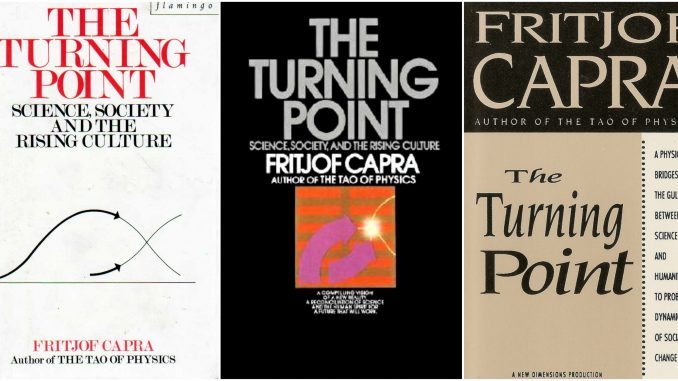
Rohan Roberts | 29 June 2018
“The Turning Point is a compelling explanation of why so many things seem wrong with the world.” – The Washington Post
“Every few years a book with the potential to radically change our lives is published. The Turning Point is the latest.” – West Coast Review of Books
“This splendid and thoughtful book is an essential guide for anyone inquiring about the place of science and metascienec in our contemporary culture.” – New Scientist
Science is the best tool ever devised for figuring out how the universe works. There is absolutely no denying that. The revolution in thinking brought about by Isaac Newton and Rene Descartes has had a powerful impact on every aspect of human life in the last 400 years.
However, in spite of the tremendous scientific advances we’ve made, society finds itself at a crisis. Environmental catastrophes abound, suicide rates have risen dramatically, and mental health issues have reached epidemic proportions. It is not alarmist to say so. The statistics bear this out. In his book, Turning Point: Science, Society, and the Rising Culture, Fritjof Capra examines the various scientific and economic crises we face through the perspectives of systems theory. He makes the case that we have been trying to apply an outdated world view – the reductionist, mechanistic, narrow world view of Cartesian-Newtonian science – to a new reality that can no longer be understood solely in terms of those concepts and precepts.
We live today in a world that is more interconnected than ever before. Capra points out that we have reached a time of dramatic and potentially dangerous change, a turning point for the planet as a whole. What we need is a new vision of reality – a new paradigm, that allow us to realise that biological, social, psychological, and environmental phenomena are all interdependent. The current crisis that the planet and society faces, is not just a crisis of individuals, governments, or social institutions. The real problem is we face a crisis of ideas – brought on by an inability as a planetary, interconnected society to see that the problems we face are systemic, interconnected, and interdependent.
Fritjof Capra, who is a physicist and systems theorist, and a founding director of the Center for Ecoliteracy in Berkeley divides his book into four parts: “the first part focuses on the nature of the problems facing society; the second part describes the historical developments of the Cartesian-Newtonian worldview; the third part elucidates the profound impact (both positive and negative) of this Cartesian-Newtonian thought on biology, medicine, economics, and psychology; and in the fourth part he describes a new vision of reality that includes a systems view of life, mind, consciousness, and evolution; a holistic approach to health and healing; the integration of Eastern and Western approaches to philosophy; a new conceptual framework for economics and technology; and an ecological and feminist perspective which is essentially spiritual in its ultimate nature.”
Capra advocates a worldview emerging from modern physics that can be called a systems view, in which the universe is no longer seen as a machine, made up of a multitude of objects, but has to be pictured as one indivisible whole, whose parts are interrelated and can be understood as patterns of a cosmic process.
Capra makes the point that “Our progress has been a largely rational and intellectual affair, and this one-sided evolution has now reached a highly alarming stage, a situation so paradoxical that it borders on insanity. We can control the soft landings of spacecraft on distant planets, but we are unable to control the polluting fumes emanating from our cars and factories. We propose Utopian communities in gigantic space colonies, but cannot manage our cities. The business world makes us believe that huge industries that produce pet foods and cosmetics are a sign of our high standard of living, while economists try to tell us that we cannot “afford” adequate healthcare, education, or public transport. Medical science and pharmacology are endangering our health, and the Defence Department has become the greatest threat to national security. Those are the results of overemphasising our yang, or masculine side – and neglecting our yin, or feminine side.’
More technology alone is not going to be enough anymore. If we are to solve the problems facing our species, then it is imperative that we start to see things in shades of grey and perceive things in duality. We must endeavour to take a yin-yang approach to life: pragmatism and spirituality, skepticism and belief, reason and emotion, the Apollonian and the Dionysian, the literal and the metaphorical, the masculine and the feminine, the organic and the mechanistic, empiricism and mysticism, rationality and intuition, Aristotle and Buddha, logos and mythos, linear and lateral thinking, induction and deduction, investigation and insight, synthesis and analysis, experimentation and imagination, intellect and instinct, science and the arts, technology and philosophy, sobriety and psychedelia, agency and meditation…. It is the ability to harmoniously use all these tools of action and cognition that will allow us to develop into a well-rounded person, attain mental peace develop a deeper, more fulfilling conception of Reality and the Self and solve the major planetary problems facing us at the moment. Fritjof Capra’s incredibly important book goes a long way in helping the reader develop just such a perspective.